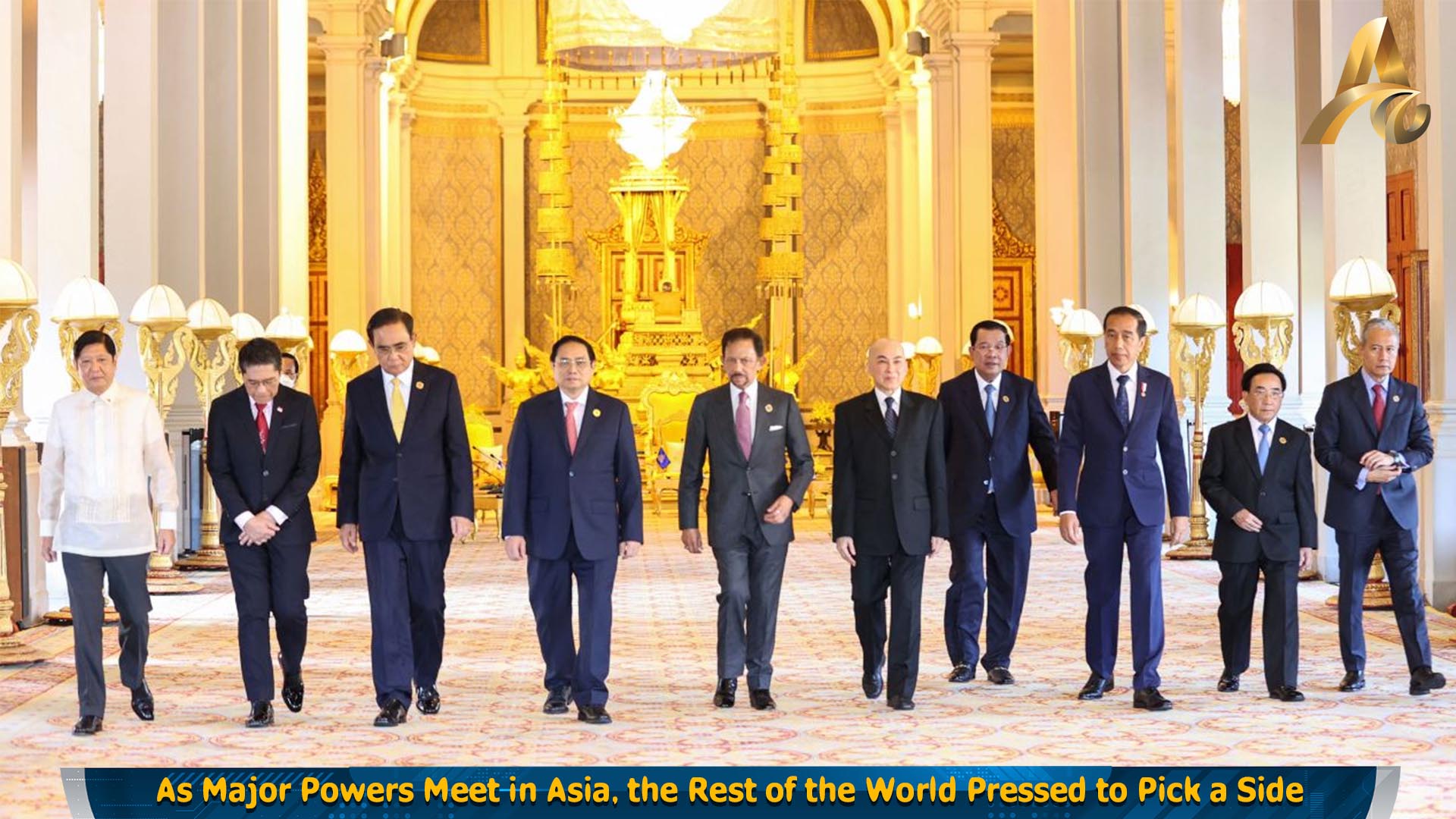ASIA: World leaders converged in Phnom Penh for the first in a series of international summits in Southeast Asia over the coming week, where divisions between major powers and conflict threaten to overshadow talks.
The first stop is the Cambodian capital where leaders from across the Indo-Pacific met alongside a summit of Association of Southeast Asian Nations (ASEAN) leaders, followed by a meeting of the Group of 20 (G20) leaders in Bali and of the Asia-Pacific Economic Cooperation forum in Bangkok.
The stacked diplomatic line-up will be a test of international appetite for coordination on issues like climate change, global inflation and rising food prices on the back of Russia’s invasion of Ukraine, and economic recovery from the Covid-19 pandemic – and the first time that all three events are being held in person since the outbreak began in 2020.
Sharp geopolitical divisions of the type not seen in decades loom over this political calendar, as the war in Ukraine has radically transformed Russia’s relationship with the West, the top two global economies US and China remain locked in intensifying competition, and the rest of the world is pressed to pick a side.
Both US President Joe Biden and Chinese leader Xi Jinping are expected to attend two of the summits in Southeast Asia – a region that has long been ground-zero for influence-jockeying between Beijing and Washington.
Xi is re-emerging on the world stage after years without travel during the pandemic, having secured a norm-breaking third term in power, while Biden heads east fresh from a better-than-expected performance by his party in the US midterm elections. Both would be expected to pitch their country as a stronger partner and more responsible global actor than the other.
The two met face-to-face on Monday on the sidelines of the G20, their first in-person encounter since Biden’s election, the White House said. Beijing confirmed Xi’s travel plans to the G20 and APEC summits, and said he would hold bilateral meetings with Biden and several other leaders.
Talks between the two could help to avert an escalation of tensions between the powers. But for the leaders meeting during the string of summits in coming days, cinching robust agreements on tackling global issues – already a tough bargain at the best of times – will be a challenge.
Divided world
Even the most regional of the meetings, the ASEAN summit of Southeast Asian leaders – which kicked off in Phnom Penh on Friday 11 and is slated to address strengthening regional stability as well as global challenges – will reflect fractured world politics, experts say.
But unlike the other major meetings, which may be more squarely focused on the fallout from the war in Ukraine, ASEAN leaders are entering the summit and related meetings this weekend under pressure to address a spiraling conflict within their own bloc: as Myanmar remains in turmoil and under military rule nearly two years after a brutal coup ousted the democratically elected government.
Differences between Southeast Asian countries on how to handle that conflict, compounded by their criss-crossing allegiances with great powers – and a reticence from the bloc to appear to take sides between the US and China – will all impact how much the group can agree on and what it can accomplish across the gamut of summits, experts say.
“Normally this season would be very exciting – you have three major world summits in Southeast Asia – Phnom Penh, Bali and Bangkok,” said Thitinan Pongsudhirak, director of the Institute of Security and International Studies at Chulalongkorn University’s Faculty of Political Science in Bangkok.
“But (ASEAN) is very much divided on Russian aggression, on the Myanmar coup crisis, on China’s belligerence in the South China Sea and so on, and this means that ASEAN is in bad shape,” he said.
At a United Nations vote last month, seven of the 10 ASEAN countries, including the Myanmar representative who is not backed by the ruling military, voted to condemn Russia’s annexation of four regions of Ukraine, while Thailand, Laos, and Vietnam abstained.
But ASEAN as a bloc has also taken a step to tighten ties with Kyiv at this week’s events, signing an amity and cooperation treaty with Ukraine in a ceremony with Ukrainian Foreign Minister Dmytro Kuleba in Phnom Penh on Thursday.
The bloc aims to use consensus among its states as its strength when it brings larger world players to the table, for example in its adjacent East Asia Summit that brings together 18 Indo-Pacific countries, including Russia, China and the United States, and also meets this weekend.
“If ASEAN cannot get its house in order, if ASEAN cannot rein in a rogue member like the Myanmar military regime, then ASEAN loses its relevance,” Pongsudhirak said. “On the other hand, if ASEAN is united, if it can muster commitment and resolve … it can have a lot of pulling power.”
(SOURCE: CNN)






















